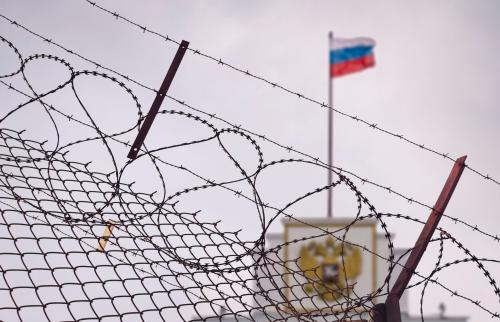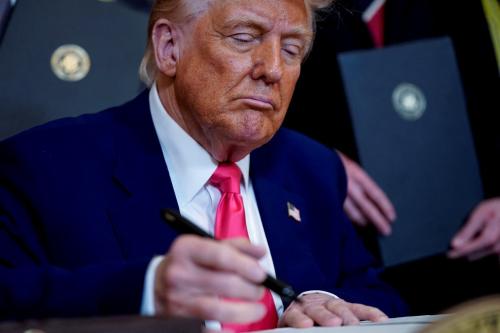Content from the Brookings Doha Center is now archived. In September 2021, after 14 years of impactful partnership, Brookings and the Brookings Doha Center announced that they were ending their affiliation. The Brookings Doha Center is now the Middle East Council on Global Affairs, a separate public policy institution based in Qatar.
Egypt’s New Gas Discovery: Opportunities and Challenges
After a tough year, the Egyptian government recently received some good news. Italy’s ENI announced that it has discovered the “largest ever” offshore natural gas field in the Mediterranean off the Egyptian coast. Dubbed a “supergiant” field, ENI suggested that the Zohr project would be able to meet Egypt’s own natural gas demands for decades to come.
This is welcome news for the government of Abdel-Fattah el-Sissi as it enters its second year and it is likely to resonate locally and regionally. Once the field comes online it will go a long way toward satisfying local demand, thus allowing Egypt to spend significantly less on energy. It would be prudent for the government to use these savings to improve people’s livelihoods and invest in infrastructure, health, and education.
From Exporting to Importing: An Unpleasant Journey
In 2003, after the discovery of sizable reserves and the establishment of pipelines and Liquefied Natural Gas (LNG) facilities, Egypt began exporting gas to Jordan, Israel, and Syria. In addition, the government had ambitious plans to export to Lebanon and Turkey.
This coincided with an increased thirst for gas locally. According to a report by the German Marshal Fund, between 2000 and 2012 overall energy consumption in Egypt rose by 5.6 percent, but demand for gas grew by 8.7 percent. By 2012, gas was providing more than 50 percent of the total energy needs of the country compared with 35 percent in 2000. Even though production had risen, nonetheless it was inevitable that in the long run demand would outstrip supply as gas was being used for industrial, commercial, and residential purposes at subsidized prices, as well as exporting.
By 2015, the party was over. Due to this exponentially increasing local demand for energy, Egypt was no longer a net exporter of gas. After initial denials by the government , Egypt began importing gas from Israel via a US company early in the year, causing local controversy as Egypt had until then been exporting to Israel for more than a decade. Adding insult to injury, Egypt imported Israeli gas at global prices despite having exported theirs to Israel at much lower prices during the previous decade.
For Egyptian energy policy makers, importing from Israel made sense as some of the existing infrastructure used for gas exports could now be used to import, despite the damage inflicted by militant groups operating in the Sinai who blow up pipelines on a regular basis.
In addition to imports from Israel, in February 2015 Egypt signed an MOU with Cyprus for a feasibility study to assess an under water pipeline for exporting gas to Egypt. The initial findings of the report are being assessed by the government to determine whether to proceed. Overall, Egyptian policy makers had been preparing for the eventual decline of local supply of gas.
Enter the Zohr
While it will take years to produce gas from the field commercially, this is nonetheless an undeniably good story for the Egyptian government as it tries to shore up its economic credentials. In a country where acute energy shortages peak in the summer months, energy supply is high on the agenda. Before ex-President Morsi was overthrown in 2013, he was being blamed for a series of power outages that had swept the country, leaving the population increasingly frustrated. The Egyptian government understands the importance of providing cheap energy for stability. Even the army has gotten involved and is currently building a series of power stations to support the ever-strained electrical supply.
The new discovery has alarmed Israeli policy makers. The Israeli energy minister Yuval Steinitz said that the Egyptian discovery is “a painful reminder that while Israel sleepwalks and dallies with the final approval for the gas road map, and delays future prospecting, the world is changing in front of us, including ramifications for [Israeli] export options.” Indeed, despite sizable fields discovered in Israeli waters, the deal between Noble Energy and the Delek group have been facing regulatory issues in Israel. The news of the discovery led to a heavy selloff of gas producers on the Israeli stock exchange.
It is likely that the new discovery in Egyptian waters will provide impetus for Israel to hasten its production, as once the Zohr field comes online, it will have direct ramifications for Israeli gas exports not only to Egypt, but regionally as well, including any potential gas deals with Cyprus and Turkey.
Now What?
The key issue now is how fast can this field become operational, and at what cost. The government has yet to publish a detailed costing of the project, including who will bear the investment cost, and more importantly, how exactly the revenues from the field will be distributed. It remains to be seen if it will become a “game-changer” as ENI CEO Claudio Descalzi suggested.
In addition to these concerns, LNG prices have been dropping due to a variety of factors globally. First, Japan, which had become one of the world’s largest LNG consumers after its Fukushima disaster, recently began restarting its nuclear reactors, thereby reducing demand. Second, there is also increased supply capacity coming online around the world that is likely to put further pressure on prices. As prices become lower, the prospective returns from the new discovery would already be under pressure.
Finally, with the Iranian nuclear deal being completed, Iran will be likely to increase investment in its LNG capabilities to become a larger regional gas producer. India has already signaled its interest in reviving a decade-old $22 billion LNG deal with Iran that was on hold due to the sanctions. Descalzi was bullish and shrugged off these concerns, arguing that the field is “another positive response to this kind of low price environment.”
Exporting aside, if this discovery is able to satisfy local demand for gas for some decades to come, then this is undeniably good news for Egypt as it will free up much needed funds for other sectors of the economy, such as health and education. Overall, August has been a good month for Egypt’s energy prospects. In addition to the Zohr gas discovery, President Sissi during his recent visit to Moscow signed an MOU to build a Russian nuclear reactor as Cairo continues to deepen its relationship with Moscow.
Neither the nuclear reactor nor the gas field will become operational anytime soon. Nonetheless they both provide a positive story for foreign investors who are weary of investing in Egypt after five years of domestic turmoil. Additionally, earlier this year, Moody’s upgraded Egypt’s credit rating to B3 with a stable outlook, which should also help entice existing and prospective investors.
All of these developments show great promise, but are yet to improve people’s lives. The government should now spend less time talking up its prospects and performance, and focus instead on actually improving people’s livelihoods. The proceeds from this new field need to be invested wisely in key areas, not squandered. The expectations of everyday Egyptians continue to rise with each positive news story, so the government must now produce some tangible results or it will risk further upheaval down the line as ever-increasing expectations remain unmet.
The Brookings Institution is committed to quality, independence, and impact.
We are supported by a diverse array of funders. In line with our values and policies, each Brookings publication represents the sole views of its author(s).



Commentary
Op-edEgypt’s new gas discovery: Opportunities and challenges
September 10, 2015